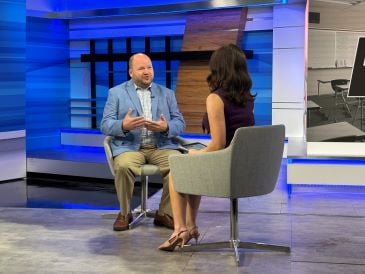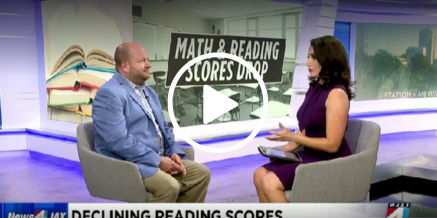This Week at READ USA
“Let kids choose what they want to read.” – Watch Dr. Kelly on Channel 4!
- Read USA Inc.
- June 28 2023
A version of the Nation’s Report Card was released last week, revealing unsettling results from standardized tests demonstrating worrisome declines in both reading and math scores among the country’s 13-year-olds.
Of particular concern to READ USA is that fewer children are reading for fun, which correlates to lower reading performance. In 2012, 33% of 13-year-olds said they read for fun “a few times a year” or less, while in 2023, approximately 47% said a few times a year or less. (You can read more in the USA Today article here.)
Our CEO Dr. Rob Kelly was invited on News4Jax’s Morning Show over the weekend to discuss what factors led to the decline and how parents can help motivate their kids to find joy in reading – thereby improving their reading performance not just for school tests, but for lifelong learning and success.


“If kids aren’t enjoying reading, and engaged in the reading, then they’re not going to get better at it… Let kids choose what they want to read, and then talk to them about what they’re reading.”
Watch the News4Jax segment below – and many thanks to the Channel 4 team and Weekend Anchor Ashley Harding for having Dr. Kelly join you!
Resources to Inspire a Love of Reading
READ USA offers multiple resources for both children and parents to help inspire a love of reading at home. As our CEO Dr. Rob Kelly has always said, “When children get to choose what they want to read, they actually want to read! It really is that simple!”
Check out some of these FREE resources from READ USA that can help cultivate a joy for reading in our little ones:
Student Reading Activity Book
READ USA provides a free, downloadable Student Activity Book featuring a variety of fun ways that you can motivate children to read. It is also available in multiple languages including Arabic, Chinese, Portuguese, Spanish, and others.
There is also a downloadable Parent Guide to help parents engage with your children about what they are reading!
Online Read Alouds
READ USA offers a number of free, online Read Alouds of popular titles read by local community leaders and members. The Read Alouds are intentionally diverse to give children options of books featuring characters that look like them. Check them out on our YouTube channel here!
Parent Resource Videos
Our Multicultural Literacy programming includes a collection of resource videos to help parents better understand how to choose appropriate books to read and discuss with their kids. The videos also will help you teach perspective taking and tackle tough questions children may ask. Check out those videos here!
Plus, the Jacksonville Public Library has a plethora of free online and in-person resources to help engage children in reading, and its Library Academy Newsletter is a great resource to get tips and information right in your inbox every month.
Children’s Book: Helen’s Big World: The Life of Helen Keller, by Doreen Rappaport
Illustrated by Matt Tavares
Helen Keller was born on June 27, 1880, and became blind and deaf at 19 months old. This
inspirational picture-book biography is an excellent and accessible introduction for young readers to
learn about this remarkable woman who overcame her physical disabilities as a child and rose to
become a humanitarian, educator, and writer.
With her signature style of prose laced with stirring quotes, Doreen Rappaport brings to life Helen
Keller’s touching narrative. Acclaimed illustrator Matt Tavares beautifully captures the vitality and
spirit of Helen Keller’s life and legacy, making Helen’s Big World an unforgettable portrait of a woman who inspirationally proclaimed, “Although the world is full of suffering, it is also full of the overcoming of it.”
Submitted by Kathi Hart, Tutoring Program Content Specialist

